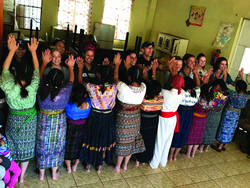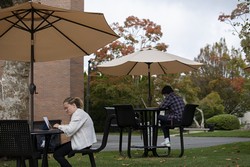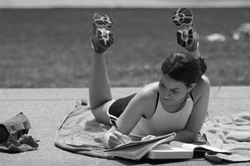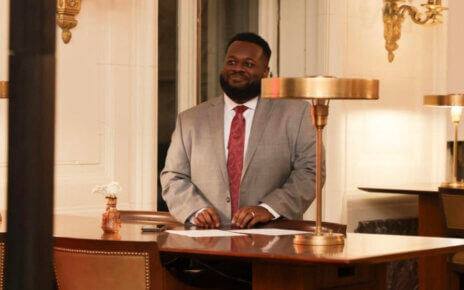I have been wrong about feminism. As a student enrolled in Guatemala Public Health, taught by Chris Hirschler Ph.D., Department Chair and associate professor of Health and Physical Education, I have been required to learn Guatemalan culture and, more specifically, the plight of the women who live there.
Before traveling to Guatemala as part of the service-learning component of this course, I read articles, watched videos, and engaged in discussions with my classmates. I came prepared to help with what I thought was a mind free of preconceived notions. With the utmost cultural sensitivity, my classmate, Sneha Bupathi, a junior health studies student, and I developed the lesson we would have to teach to victims of domestic violence.
Bupathi said, “We decided on art therapy because we wanted the women we worked with to relax, express their feelings, and create something that they could keep.” Knowing that we needed an expert opinion, we consulted Jennifer Gottshall, an adjunct professor of health and physical education, who approved of our plan and added that “Art therapy also has the ability to enhance confidence,” a trait that any victim of domestic violence is likely lacking.
Needless to say, I knew I would be working with women throughout the course of this trip, but no article, documentary, or class discussion could have prepared me for what I was about to experience.
Milagros is a 16-year-old girl who has been working as a market vendor in Chichicastenango, Guatemala since she was five years old. She is extremely grateful that she is able to attend school. She hopes to change the history of her family by becoming an English teacher or a nurse. Each week, she looks forward to being blessed by God, bettering herself, and learning new things.
When asked “What is it like to be a woman in Guatemala?” she proudly answered “Well, in Guatemala, for example, for me, in Chichicastenango, I rarely wear pants because I like to represent Chichicastenango by wearing my dress…I look better like this, walking with my dress on…We [Chichicastecas] will not lose our religion, it’s how we are.”
Juana is the social worker for Nuevos Horizontes, a domestic violence shelter in Quetzaltenango. She wakes up every day and prepares food and necessities for her baby, her husband, and herself. She then commutes two hours to work, one hour on foot and one by bus, to coordinate programs for the women and children at the shelter and, essentially, to take care of them as well. She helps women and adolescents who have been abused physically, psychologically, and economically. She hopes that all of the women who stay at the shelter feel empowered in their country; have rights to life, to education, and to a dignified career; and achieve economic stability that allows them to fulfill their needs. She hopes that they obtain a home, earn a fair salary, and avoid violence and discrimination on behalf of men.
When asked “What is it like to be a woman in Guatemala?” she proudly answered “Well, actually, women have been gaining a better role. Previously, in our history, women were discriminated against and categorized. They had neither a voice nor a vote. They did not have the right to participate as citizens. The current dream is changing because we are already realizing the rights of women- equality and equity.
We already have a role under the workforce and the education that we have received. We are paid for our work and receive the same benefits as men. The representation of women in Guatemala, actually, out of 100 percent, I consider it to be about 60 to 75 percent. We have not reached 100 percent on the part of machismo, but we are working on this so that women will be 100 percent recognized, as men are, creating equity amongst women and men.”
The service trip component of Guatemala Public Health provided my classmates and I with the opportunity to build bunk beds for impoverished families, bring supplies to government hospitals, and teach health lessons at a domestic violence shelter.
I was deeply affected by all that I witnessed throughout my time there, but something I cherish the most about the trip is the extent of my interactions with Guatemalan women. We laughed together, we cried together, and, most importantly, we empowered one another.
In the United States, we have an image of what feminism looks like as well as the goal we would like it to achieve- equality of the sexes in all sectors. We ask for equal pay, equal protection under the law, and equal societal standards. In Guatemala, feminism and empowerment are asking for very different outcomes.
For Milagros, empowerment means her right to education, her ability to preserve the values of her family and community, and her opportunity to break the mold. For Juana, empowerment means her position as a woman helping women; the rights of Guatemalan women to life, education, and employment; and the achievement of 100 percent representation of women in Guatemala.
As women in the U.S., we fight for the right to show our bodies without shame, to love ourselves as we are, and to pursue our passion knowing that we will be treated fairly. And we should fight. However, while we fight, we must keep in mind the plight of women all over the world and how that may look very different from our own struggles.
So, as U.S. citizens that exist on a spectrum of gender, race, ethnicity, and sexuality, we must remember Guatemalan women. We must respect the stories of Milagros and Juana. We must keep our hopes high and, most importantly, our feminism intersectional, international, and adaptable.
PHOTO COURTESY of Hope Avalone




